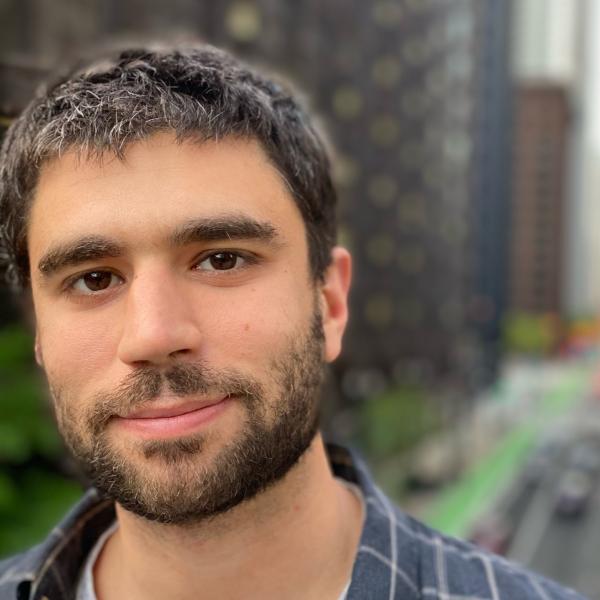
Ryan Simonelli received his PhD in philosophy from the University of Chicago and his BA from New College of Florida. He works mainly in philosophy of language and philosophical logic and is particularly concerned with the relationship between the ability to speak a language and the ability to conceptually grasp what things in the world are and how they might be. As such, his work inevitably crosses over into issues in metaphysics, philosophy of mind, and epistemology. It is also often guided by an implicit or explicit engagement with certain key figures in the history of analytic philosophy, such as Ludwig Wittgenstein and Wilfrid Sellars. He also does non-academic philosophy and lots of other things like surfing, swimming, hurting himself skateboarding, blundering pieces in chess, mixing music, and making art.
Recent Courses
PHIL 28101 Appearance and Reality: Perspectives Across Philosophical Traditions
Is the world really as it appears to be in everyday experience, or is the world of everyday experience really a world of mere appearances, radically unlike the reality that lies behind it? This is arguably the most fundamental philosophical question that one can ask, and it has occupied a central place in perhaps every philosophical tradition that has arisen across the globe. In this class, we will consider how this question arises across two distinct philosophical traditions—Classical and Modern European Philosophy, on the one hand, and Classical Indian philosophy, on the other—seeking to compare and contrast the different philosophical impulses, approaches, and answers to this question across these traditions. Historical readings will be from key figures in the different philosophical cannons, such Plato, Aristotle, Descartes, Hume, and Kant in Europe, and Vasubandu, Dharmakīrti, Nāgārjuna, Candrakīrti, and Śaṅkara in India. Historical readings will be supplemented by works by contemporary philosophers. (B)
PHIL 20100-01/02/30000-01/02 Introduction to Logic
An introduction to the concepts and principles of symbolic logic. We learn the syntax and semantics of truth-functional and first-order quantificational logic, and apply the resultant conceptual framework to the analysis of valid and invalid arguments, the structure of formal languages, and logical relations among sentences of ordinary discourse. Occasionally we will venture into topics in philosophy of language and philosophical logic, but our primary focus is on acquiring a facility with symbolic logic as such.
Students may count either PHIL 20100 or PHIL 20012, but not both, toward the credits required for graduation.
PHIL 23104 Doing Things with Words
Words, it might seem, are for saying things, communicating bits of information. And, of course, they are for that. However, there all sorts of things that we can do with the use of language that go beyond simply saying things. We can, for instance, make a promise, forbid someone from doing something, or exclude someone from our community. These are all different kinds of “speech acts” we might perform, and they form the topic of speech act theory. This class, a venture into speech act theory, will look at these different types of speech acts while seeking to develop a unified framework for thinking about them based on the thought, variously spelled out by the theorists we’ll read, that speech acts work by shifting the norms to which speakers take themselves to be bound. We will start with the philosophical foundations of speech act theory, starting with the pioneering work of Ludwig Wittgenstein before turning to J.L. Austin’s seminal How to Do Things with Words. We will then turn to contemporary developments of speech act theory, focusing on one area where it has been most fruitfully applied and developed in recent years: social, and especially feminist, philosophy. Specific topics in this latter part of the course will include silencing and other forms of discursive injustice, consent and other kinds of sexual negotiation, derogatory, exclusionary, and oppressive speech, acts of protest, and expressions of solidarity, with work from Rae Langton, Jennifer Hornsby, Jennifer Saul, Quill Kukla, Mary Kate McGowan, Cassie Herbert, Matthew Chrisman, Graham Hubbs, and Mark Lance among others.
PHIL 23401 Philosophy and Science Fiction
How do we know whether our perceptual experiences really are of a real world outside of us? What determines the identity of a person over time? What does it take to be conscious, and how can we tell whether someone or something is? Could radically different languages lead to radically different forms of experience and thought? These are key questions in the philosophical fields of epistemology, Metaphysics, Philosophy of Mind, and Philosophy of Language. In this course, we’ll explore these questions (and more) as they arise in works of science fiction and consider the main philosophical proposals for tackling them with an eye to these works. The main works with which we’ll engage will be the films “The Matrix,” “Moon,” “Ex Machina,” and “Arrival,” though there will be many supplementary works of science fiction. Philosophical readings will be drawn from both historical and contemporary sources. (B)
